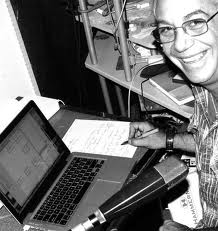 Mike Watt is two hours early and sounds ever-so slightly irritated, which is alarming since he’s universally regarded as one of the nicest, coolest cats to ever walk the Earth. And it’s not my fault but Watt is totally within his rights. If he was beefing, it was completely justified. Fresh off a 23-date European tour with one of his many projects, il Sogno del Marinaio, Watt has just barely returned to his beloved home of San Pedro, California, only to find that his internet doesn’t work. Therefore, he’s had to “borrow” a Skype connection from a friend in order to do our interview, and to make things even worse, reschedule his plans in order to accommodate me. We were originally scheduled to chat at 9:00 a.m. PST—when he called—but a few days later, Watt’s p.r. dude sent a message saying that Watt wanted to change it to 11:00 a.m. Seems he wanted to shoot a video in his kayak.
Mike Watt is two hours early and sounds ever-so slightly irritated, which is alarming since he’s universally regarded as one of the nicest, coolest cats to ever walk the Earth. And it’s not my fault but Watt is totally within his rights. If he was beefing, it was completely justified. Fresh off a 23-date European tour with one of his many projects, il Sogno del Marinaio, Watt has just barely returned to his beloved home of San Pedro, California, only to find that his internet doesn’t work. Therefore, he’s had to “borrow” a Skype connection from a friend in order to do our interview, and to make things even worse, reschedule his plans in order to accommodate me. We were originally scheduled to chat at 9:00 a.m. PST—when he called—but a few days later, Watt’s p.r. dude sent a message saying that Watt wanted to change it to 11:00 a.m. Seems he wanted to shoot a video in his kayak.
San Pedro is a harbor town and Watt lives about a mile from the ocean; therefore, it’s paradise for a kayak enthusiast and all-around Aquaman like Watt. The ocean and the seas have long been an integral part of Watt’s work. “OK,” I wrote back. “No prob.” Well, no internet means no email and apparently, Watt didn’t get the message that I agreed to the schedule change. So that just acts as a perfect example of Mike Watt’s character. There’s no bullshit with him. If he says he’s gonna talk to you at 9:00, unless he hears otherwise, that’s what he’s going to do. Guys like Mike Watt are hard to come by.
 Fortunately, I had signed on to Skype at 6:00 a.m. PST, just in case. Honestly, I was really anxious about the interview. It’d been 10 years since I’d seen or talked to Watt. A lot of things had changed. He joined Iggy Pop and the Stooges, that’s a pretty big deal. He toured the world many times over in one of his countless projects. He has his own bobblehead. I think that’s how you know you’ve made it in punk rock. In the meantime, I’d always tracked his movements via Mike Watt’s Hoot Page; his diaries (aka tour spiels) have always been some of my favorite reading materials.
Fortunately, I had signed on to Skype at 6:00 a.m. PST, just in case. Honestly, I was really anxious about the interview. It’d been 10 years since I’d seen or talked to Watt. A lot of things had changed. He joined Iggy Pop and the Stooges, that’s a pretty big deal. He toured the world many times over in one of his countless projects. He has his own bobblehead. I think that’s how you know you’ve made it in punk rock. In the meantime, I’d always tracked his movements via Mike Watt’s Hoot Page; his diaries (aka tour spiels) have always been some of my favorite reading materials.
For those of you who read Petrology 202: Carol Kaye, you’ll remember that I said my biggest fear in doing interviews with my heroes was being so star-struck that it turns into the Chris Farley-Paul McCartney skit on Saturday Night Live. “The Chris Farley Show” sketch was a regular feature of the program. Rather than ask his guest meaningful questions, or allow his guest to promote his latest project, Farley would fumble and stutter, and typically describe scenes or events from the guest’s work and life. After asking the guest whether he remembered this particular event, Farley would say, “That was awesome.” Other times, he would ask questions that had nothing to do with the guest or their work. Once the guest answered, Farley would pull his hair, smack himself in the head and say, “I’m such an idiot!”
His interview of Paul McCartney was no different. Farley was awestruck and asked ludicrous questions: “Do you remember when you were in The Beatles?” or in reference to rumors of Macca’s death: “That was a hoax, right?” Five minutes of that is a looooong time in my headspace. The very last thing I wanted to do was go Chris Farley on Carol Kaye or any other artist. The point of doing an interview is to get something out of the interviewee that nobody knows, and that’s a tricky thing to achieve. I can do it with friends and acquaintances because they don’t know I’m doing it. But people like Paul McCartney and Mike Watt have been doing interviews as long as I’ve been alive; so they’re completely aware of the journalist trick bag. Unfortunately, I did go a little Chris Farley on Watt. Not much but enough that I listened back to the interview and wanted to smack my self in the face on several occasions. Fortunately, Watt is Watt. He let me windbag way longer than I intended or expected.
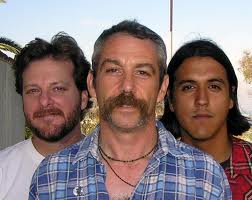 Meanwhile, before the call came in, my inner question was: “Do I have the ability to engage him on a personal level, rather than have a standard journalist-versus-musician dialogue?” But I wanted to talk to Watt as a friend; not because I’m a journalist—actually, I’m not a true journalist; I’m more of an active observer. In the end, what I am is just another schlub in a long line of people who are huge fans of Watt’s work, and at one time, I was vaguely what you might call a “peer”. In fact, the last time I saw him was when Henry Miller Sextet (my band) played Bottom of the Hill (S.F.), opening for Mike Watt + the Secondmen. Plus, he’s one of my Heroes. Seriously, think about that. Mike Watt is Bob Dylan to me—he’s my Paul McCartney. Meanwhile, I was taking in as much of his work as possible; reading and re-reading the spiels, watching the videos, listening to the jams. I don’t want to talk to one of my heroes like some jackass from the New York Times who is completely unfamiliar with his work and what he’s all about.
Meanwhile, before the call came in, my inner question was: “Do I have the ability to engage him on a personal level, rather than have a standard journalist-versus-musician dialogue?” But I wanted to talk to Watt as a friend; not because I’m a journalist—actually, I’m not a true journalist; I’m more of an active observer. In the end, what I am is just another schlub in a long line of people who are huge fans of Watt’s work, and at one time, I was vaguely what you might call a “peer”. In fact, the last time I saw him was when Henry Miller Sextet (my band) played Bottom of the Hill (S.F.), opening for Mike Watt + the Secondmen. Plus, he’s one of my Heroes. Seriously, think about that. Mike Watt is Bob Dylan to me—he’s my Paul McCartney. Meanwhile, I was taking in as much of his work as possible; reading and re-reading the spiels, watching the videos, listening to the jams. I don’t want to talk to one of my heroes like some jackass from the New York Times who is completely unfamiliar with his work and what he’s all about.
Anyway, I was cramming my notes with last minute research when out of nowhere, his call came in. Shaken up pretty good, I forgot to press record for the first 30 seconds or so.
Mike Watt: [in media res] I don’t have a landline.
Christian Adams: Did you get out on the water?
MW: No. I’m doing this with you here now. I will after this.
CA: Man, I really, really appreciate you taking time out for me.
MW: No problem. Much respect.
CA: I’ll turn on my video so you can see me. You probably don’t remember me but whatever.
MW: There’s not enough bandwidth. This is a poor connection. I think we should just do voice.
CA: Right on.
MW: We call it a “half-ass in the meantime.” Now, I’m only gonna be here ‘til Tuesday, see.
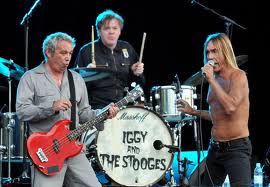 CA: Right, you’re going to be Down Under [with Iggy Pop and the Stooges] for…three weeks?
CA: Right, you’re going to be Down Under [with Iggy Pop and the Stooges] for…three weeks?
MW: Two and a half weeks.
CA: Overall, how was the European tour with—forgive me—I don’t want to butcher it so I’ll say it in English, Dream of the Sailor.
MW: No, it’s il Sogno del Marinaio, which means the The Sailor’s Dream. It was 23 gigs in 23 days.
CA: I read every single tour spiel.
MW: Three Italian [gigs], three French, one Swiss, two German, two Dutch, ten England, one Scotland, one Northern Ireland, one Ireland.
CA: How’s your Italian now?
MW: [deadpan] I know some words. Some came back to me from when I was younger, from my grandfather. Yeah, it’s weird. They’re beautiful guys, Stefano and Andrea. You got to read their tour diaries, too, right?
CA: I did. I read everything. Maybe don’t know because you don’t have a landline, but there’s already video of, starting as far back as the Jesi show [the second gig of the tour] on YouTube. So I’ve been able to watch about half of the tour.
MW: Well, if you read their tour diaries, Stefano and Andrea have their perspective and they really enjoyed the tour. It’s a different kind of band. With [the] Stooges, I take direction. With Missingmen and Secondmen, I give direction. This is a collaboration. Does that make sense?
CA: The band has a very different but specific vibe or aesthetic, which I’ve heard from other Italian rock bands like Giardini di Miro and maybe even Afterhours, but it’s a sound I haven’t heard many from American bands. “Zoom!” is a good example of that; it’s like a sea shanty meets Can.
MW: Well, that was written by Andrea Belfi. He’s a composer.
CA: It’s almost Fellini-esque. Like, even saying the name, il Sogno del Marinaio, just puts me in a different place, like I almost have to pretend I’m a full-boat dago for the three seconds it takes to say it.
MW: Andrea’s very much into Robert Wyatt and Soft Machine.
CA: Ah! Robert Wyatt does a version of [the Monkees’] “I’m a Believer” that is so rad.
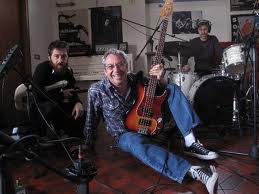 MW: So you gotta understand, Andrea and Stefano are 21 years younger than me. Other than that, they’re also more from the avant-garde. Their younger years were punk rock, so we share that, but it’s a different kind of musical direction.
MW: So you gotta understand, Andrea and Stefano are 21 years younger than me. Other than that, they’re also more from the avant-garde. Their younger years were punk rock, so we share that, but it’s a different kind of musical direction.
CA: I’ve been listening to a lot of new Italian rock—it’s really difficult to find an interesting American indie rock band these days.
MW: [Laughs]
CA: Well, I was wondering, since you’ve been there, with this music there’s a very…I don’t know how to articulate it. There’s a very different vibe. So I wanted to ask if you could kind of shed some light on that.
MW: There are a couple of elements. It’s cinematic. They watch a lot of movies. You said Fellini. That’s the way I think they compose. There’s a Scottish band that does this too, they’re called Mogwai.
CA: Of course.
MW: There’s a U.S. band, Explosions in the Sky.
CA: Remember Giant Sand?
MW: Yeah. Montreal’s got Godspeed You Black Emperor. So I think there’s a lot of people—Sonic Youth—that take a cinematic approach to music.
[Redacted: Some incoherent blathering from me in the vein of, “Man, Watt, it’s…like such a…goddamn you’re like…” It goes on for about a minute.]
CA: I’m curious, what was one takeaway from Italy? What were you struck by, other than not being able to park the boat?
MW: Oh you mean the land? The people?
CA: Yeah, sure. Anything.
MW: Of course, there’s an incredible amount of history. It goes back to Rome and stuff.
CA: And you’re very into history. We [Watt’s fans] all know that.
MW: D. Boon got me into history. That was U.S. history. But you start touring other places and want to know about other people and their histories.
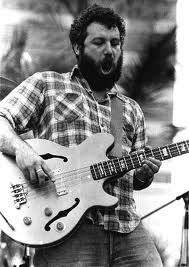 CA: Did you enjoy the two tours of Japan? Did you know I’m in Taiwan right now? There’s a lot of history between Japan and Taiwan. You might find that interesting.
CA: Did you enjoy the two tours of Japan? Did you know I’m in Taiwan right now? There’s a lot of history between Japan and Taiwan. You might find that interesting.
MW: It [his tours of Japan] was more than two. But I haven’t got to play Taiwan yet. I really wanna.
CA: I would love for you to play Taiwan! But I know you’re a busy man, so I’ll move on to the next question. [short pause] I’ve read in several spiels where you talk about how the Stooges changed your life, both before and now that you’ve been in the band. But honestly, the type on your site is so tiny that I don’t recommend that people look for those passages without a microscope.
MW: The browsers have ways of making the type bigger [chuckles]. But the Stooges before—they were very instrumental in the development of punk rock. There probably wouldn’t have been a punk scene if it weren’t for the Stooges.
CA: With punk I see sort of a timeline of development. It almost started with Jim Morrison—no, I’m trying to think of someone who came before him. Syd Barrett was even crazier than Morrison.
MW: Punk rock starts with Little Richard and Jerry Lee Lewis.
CA: I kind of see Iggy [Pop] as taking the Jim Morrison thing to the next level. I just read this article about Raw Power and it said that the producer was totally trying to make them an edgier version of The Doors.
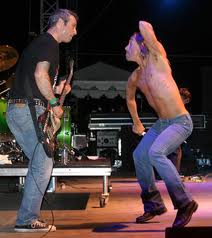 MW: What James Williamson [The Stooges’ guitarist] told me is that they went to a T. Rex gig and they said that’s what they wanted to do. That’s what James told me: a T. Rex gig. They wanted to do that.
MW: What James Williamson [The Stooges’ guitarist] told me is that they went to a T. Rex gig and they said that’s what they wanted to do. That’s what James told me: a T. Rex gig. They wanted to do that.
CA: Rad!
MW: [laughs] I know Ig saw The Doors a couple of times. I asked him about it. He said one time they were very good, and one time the singer was stoned.
CA: You’re so busy, Mike. I look at the projects you have going—
MW: Christian, you wanted to know about after I joined The Stooges. You know, Ig’s helped me become a much better bass player. This is actively working with the man. He’s like a conductor. He doesn’t operate a machine. It’s a different perspective. He’s helped me a lot.
CA: I like that he calls you out whenever you drop a clam [Note: a clam is a wrong note]—oh, I gotta ask you about that!
MW: Oh he’ll say stuff. He’ll say, “I’m gonna bust you on that, Mike.” Ig’s a very straight-forward guy. He doesn’t play games. It’s very refreshing. You practice with Ig and it’s total focus.
CA: Does it every get overwhelming? I can’t even rattle off all the projects you’re involved in.
MW: I try to manage things. Everybody’s got something to teach me. I want to put myself in challenging situations.
CA: There’s a short film about Ian Mackaye of Fugazi, to be honest I’ve only watched the first three minutes of it, but anyway, at the beginning he says that his definition of happiness is being busy, because when he’s busy, he’s not thinking about all the other shit. He’s not thinking about anything except his work.
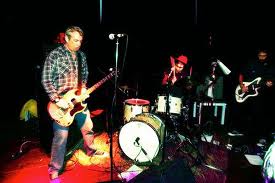 MW: I agree with that. He’s an old friend of mine.
MW: I agree with that. He’s an old friend of mine.
CA: I wanted to ask about the 15-minute version of “Time Will Come Today” that you guys called “Clams Get Dropped Today” [Chambers Brothers’ song, recorded by il Sogno del Marinaio while on tour in Germany].
MW: No, it’s “Clams Get Blown Today”. It hasn’t been finished. It’s got to be mixed. It was recorded right after the Cologne gig.
CA: What are they waiting for?
MW: Well, the engineer guys are trying to do a real psychedelic mix of it. I asked them to make it a real strange, crazy thing.
CA: I can’t wait to hear that! And I remember that you said they were as much a part of the song as the band was.
MW: Right, that’s what il Sogno del Marinaio is about. It’s about collaboration. It’s one half of these two worlds that I’ve been in lately [The Stooges and il Sogno]. Well, I’ve been in a third world, too, where people send me tracks and I put bass on them in my pad here.
CA: Carol Kaye charges a thousand dollars a cut. She doesn’t care what it is—or she didn’t used to care what it was. Nowadays, if it isn’t jazz, she won’t touch.
CA: Forgive me if this is rude and please tell me if it is, but what is the Watt daily rate?
MW: To play on somebody’s record? It’s usually for free.
CA: I’m nobody special but that’s the way I’ve always done it with my friends and they’ve done it for me. There’s no money changing hands.
MW: All payment is not in the coin, Christian. Anytime you play, you’re investing in the next time you play.
CA: I’m dying to know, how lucrative is touring with the Stooges for you personally?
MW: I do my own tours, too.
CA: But the Stooges—is it fuck-you money? Is it even a condo in Pedro? I don’t know.
MW: I live in an apartment.
[Long Pause]
CA: OK, you don’t want to talk about it. I’ll move on.
MW: No, it’s—I make a living playing gigs. And I was making a living at it before I was in The Stooges.
CA: Can I ask about fIREHOSE?
MW: Yep.
CA: You did the reunion last year. Are there any plans to do it again?
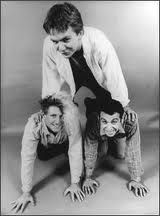 MW: Well, if I have time. Edward [Crawford] lives in Pittsburgh, you know.
MW: Well, if I have time. Edward [Crawford] lives in Pittsburgh, you know.
CA: I heard him on the radio the other night. I never got to see the Minutemen. What was touring with R.E.M. like? I know they had the tour bus, but were you guys like following behind in the van?
MW: No, we were on our own route. We played the same places.
CA: How did [the fIREHOSE song] “Song For Michael Stipe To Sing” come about. That’s a treasured jam, by the way.
MW: We were playing Athens and Mike Stipe came to the gig and said he was gonna do a solo album and asked me to write a song for him. So I did. He never made the record, so I gave it [the song] to Edward.
CA: Stipe seemed like the least likely candidate to be making a solo album in 1985, but what did you think of the idea?
MW: I liked him. He was a nice guy. I mean, it was an honor to be asked to write a song, so I wrote him a song.
[Redacted: I start nattering about seeing fIREHOSE in Chicago. Goes on for a while.]
CA: Do you remember the Big Boys from Austin?
MW: Their first Hollywood gig was with the Minutemen, and the Butthole Surfers opened up. They were doing kind of what we were doing, but doing it in Austin.
CA: From your tour spiel, I’ve noticed that food is super important to you.
MW: [laughs] Well, I get interested in it.
CA: I enjoy that part of the diary.
MW: A diary is a way of giving people first-hand experiences.
CA: Do you still use chopsticks even while at home?
MW: Yeah, I like to use ‘em. In Japan, they’re called hashi. It’s like manual transmission versus automatic.
CA: You wrote about not trusting the internet “cloud”?
MW: Well, it’s like a knife; it can be used for good things and bad things. You gotta be choosy. You gotta be aware. You gotta be intelligent. Think about stuff. It’s sort of like CB radio, you know?
 CA: Where does the “chimp diary” reference come from [in his tour spiels].
CA: Where does the “chimp diary” reference come from [in his tour spiels].
MW: There’s a theory that if you put a bunch of chimps in a room with typewriters, that eventually they would write all the works of William Shakespeare.
CA: I knew it! What about the “clam” reference.
MW: Clam is old slang from jazz music for fuck-ups. Buddy Rich used it a lot. I’ll send you the transcripts of those tapes, you know the—
CA: Oh yeah.
[Short pause. Watt sends a link to the transcripts of the infamous Buddy Rich tapes. I babble about the chimp theory.]
CA: Cool. Thanks for the link. This is an oddball question but, what was up with George [Hurley’s] reverse mullet?
CA: That’s it! Now I remember. OK. You’re going on tour with The Stooges and then you have a couple of months off. What are your plans?
MW: It’s only a month. Like I said, I’ve got projects. People send me tracks. I’ve got a couple of days left here to play catch-up.
CA: With so much stuff on your plate, people demanding your time, does it ever get to be too much?
MW: No. “No wine before its time.” Sometimes it just takes a little longer.
CA: Everywhere you go, every show you play, there’s like a hundred bros and they all want to talk to you and buy you a drink. I know that in Henry Miller Sextet, our dream was to hang out with you for one night and get hammered.
MW: [laughs]
CA: How have you avoided all the sex, drugs, and rock n’ roll of being on the road? You’re a road dog, dude.
MW: [still laughing] Yeah, a little bit.
CA: How did you avoid the pitfalls and the stereotypes?
MW: Keep busy with work and music.
CA: There’s a lot of down time on tour. A lot of time to get in trouble.
MW: That’s why you gotta keep the music. And also, I do a diary while on tour to keep focus. Like therapy.
CA: How often do you break strings these days?
MW: Not much. My hands ain’t as strong as they used to be.
CA: Are you ever going to go back to using a pick?
MW: Maybe. I used it with J. Mascis.
CA: How was that experience?
MW: He’s a very interesting musician—great guy.
[Long pause. At this point, Watt seems to be tiring of the conversation; the answers are shorter and he doesn’t respond to prompts, like the preceding J. Mascis question. I begin fumbling through my notes, hoping to find something he might want to talk about.]
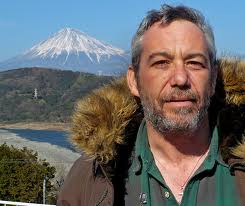 CA: Sorry, Mike. I just went totally baka there for a second. Oh! I’m glad it happened because now I remember something. I think the Hoot Page needs a glossary of terms. I went through and made a list of all the terms like “baka” and “clam”. I think it would be cool to hear exactly where all of those come from. I’m offering my services to put this together.
CA: Sorry, Mike. I just went totally baka there for a second. Oh! I’m glad it happened because now I remember something. I think the Hoot Page needs a glossary of terms. I went through and made a list of all the terms like “baka” and “clam”. I think it would be cool to hear exactly where all of those come from. I’m offering my services to put this together.
MW: [laughs] OK.
CA: If you’re down with it, here’s my idea: each term can have a definition and an example of usage. I’ll then ask you to comment on each term, to, you know, give it a bit of history. Just like earlier in the conversation. For instance, I still don’t know where “baka” comes from.
MW: [sounds annoyed] It’s Japanese for idiot. I’m an ala carte guy, Christian. I take a little from here and there.
[Redacted: Now I can really tell that Watt is done with this, and I’m trying to either save the interview or let him off the hook. More babbling about him being busy and not wanting to take up any more of his time, which of course, I do. I talk a little bit about my life and say, “I could tell you a bunch of stories but I’m sure you don’t care.” I mention my son and then turn the focus back to Watt.]
CA: Your father was a strong influence on you, and a lot of people didn’t grow up with a dad who would talk about his life. In your case, he was in the Navy.
MW: I was pretty lucky that way. But it seemed like his life in the Navy was parallel to my life on tour.
CA: I read in one article that you told a story about how he would come back from being at sea, and he would drive around with you and talk about all the stuff he saw.
MW: Many hours. But I didn’t see him a lot because he was always at sea. A sailor’s life is hard for a family.
CA: I’m not a sailor but—
MW: I said a sailor’s life, Christian.
[Redacted: A failed attempt to phrase a question about the difference between people who live in one place all their lives, versus those who seem to never stop moving, which somehow tries to address Watt’s choice to stay in Pedro. Watt mentions that he tours a lot and I feel really stupid. About a minute of this is wiped. Finally, I talk about a feature I want to do here on BSM called “Wishlist”, where I ask other musicians the following inane question.]
CA: Do you have any records that you wished you had played on or been a part of that particular band?
 MW: Oh yeah. Tons. Roky Erickson’s “Sweet Honey Pie”. I like the words and the chords. I’ve even done a bass solo over it. There are other songs, too. I like Captain Beefheart’s “Dirty Blue Jeans”. I like T. Rex’s “Telegram Sam”. I like what Jack Bruce did on Robert Johnson’s “Crossroads” with Cream. I like The Who’s “Young Man Blues” with John Entwhistle on bass. I like Larry Graham on “Thank You For Letting Me Be Myself” [sic]. I like James Jamerson on “My Girl”. You know there’s a lot of good bass out there. There’s a lot good guys writing words. I like Wire’s Pink Flag. That was a huge influence on the Minutemen. I like The Fall’s Dragnet.
MW: Oh yeah. Tons. Roky Erickson’s “Sweet Honey Pie”. I like the words and the chords. I’ve even done a bass solo over it. There are other songs, too. I like Captain Beefheart’s “Dirty Blue Jeans”. I like T. Rex’s “Telegram Sam”. I like what Jack Bruce did on Robert Johnson’s “Crossroads” with Cream. I like The Who’s “Young Man Blues” with John Entwhistle on bass. I like Larry Graham on “Thank You For Letting Me Be Myself” [sic]. I like James Jamerson on “My Girl”. You know there’s a lot of good bass out there. There’s a lot good guys writing words. I like Wire’s Pink Flag. That was a huge influence on the Minutemen. I like The Fall’s Dragnet.
CA: How about The Fall’s drummer?
MW: They recorded big toms on that record.
CA: So again, after The Stooges tour, what’s going to happen?
MW: Just keep playing bass. In the summer between Stooges gigs, I’m going to try to record the second il Sogno del Marinaio record. Since I’m gonna be over there anyway, you know? Maybe in August. Then I have to mix The Black Gang album.
[Short pause. I look at the clock and see that 40 minutes have elapsed, which was 20 minutes more than I wanted to waste of Watt’s time.]
CA: Well, Mike. It was an honor to windbag with you. I’m basically out of questions. Thank you, thank you, thank you. You have my utmost respect.
MW: You’re welcome, Christian.
CA: I’ll send you the Watt Glossary of Terms.
MW: OK. Sure.
CA: Again, thank you so much for your time. I’m a life-long fan. Much respect.
MW: Thank you. OK, Christian. See you, brother.

